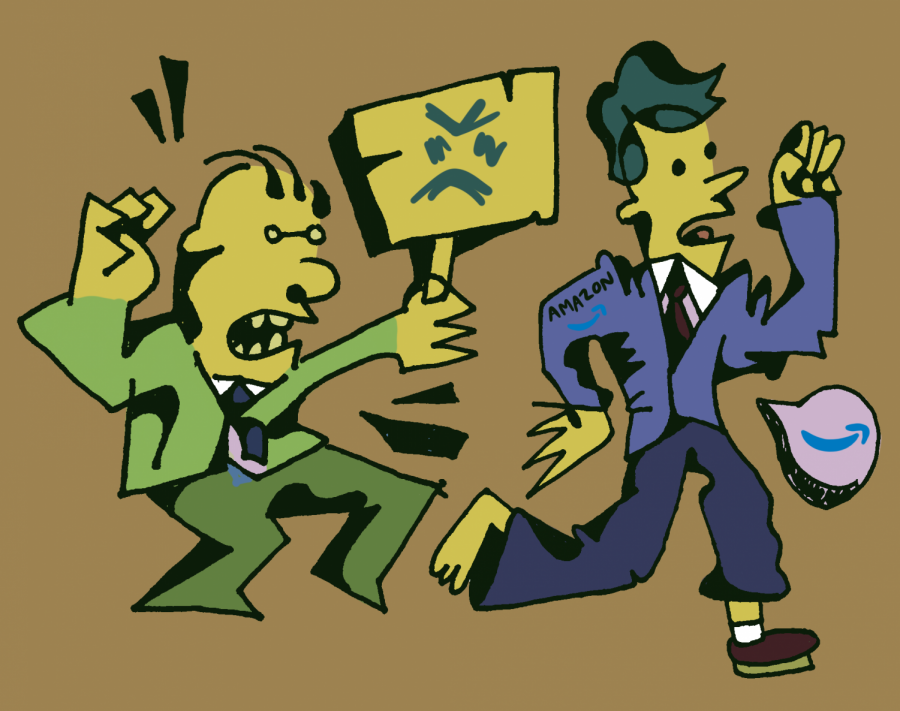Amazon’s e-commerce dominance attracts attention from lawmakers and small businesses
May 6, 2021
Federal legislators and business organizations are calling for stricter antitrust laws to address Amazon.com Inc.’s growing prominence in e-commerce. They cite the tech giant’s ability to pressure third party merchants into complying with its demands as a marketplace operator and seller as the main issue.
Amazon has headlined U.S. e-commerce retail for several years, passing Walmart Inc. as the world’s top overall retailer in 2019. Estimates say Amazon’s 2020 U.S. sales reached $318.41 billion, which accounted for 39.8% of all U.S. e-commerce sales, according to eMarketer.
Other estimates from eMarketer predict that Amazon will earn $367.19 billion in U.S. e-commerce sales this year, 300 billion more than the next highest e-commerce retailer.
Democratic lawmakers in the U.S. House Judiciary Antitrust Subcommittee concluded Amazon’s e-commerce dominance is the foundation of its “monopoly power over third-party sellers on its marketplace” last October, at the end of the subcommittee’s 14-month investigation into the practices of Amazon, Apple Inc., Facebook Inc. and Google LLC, according to CNBC.
The subcommittee’s assessment is corroborated by former Amazon officials and executives who said it was common for the business to “leverage dominance” within its sectors and threaten “punitive action” on its vital services to coerce its partners to agree to its demands, according to the Wall Street Journal.
For instance, ecobee, a Canadian company that makes smart-thermostats, was pressured by Amazon to provide data from their voice-enabled devices, The Wall Street Journal reported.
When ecobee refused to give the data over out of fear of violating the privacy of its customers, Amazon reportedly told ecobee that this decision could impact the company’s ability to sell on the tech giant’s marketplace.
PopSockets CEO David Barnett told a similar story when he testified during an antitrust subcommittee hearing last January. Barnett said Amazon pressured his business to lower their prices and threatened to sell similar products from third-party sellers if they refused to do so.
“One of the strangest relationships I’ve had with a retailer is with Amazon,” Barnett said, according to CNBC. “The agreement appears to be negotiated in good faith, but what happens is there are phone calls where we get bullying with a smile.”
Amazon criticized the subcommittee’s findings at the time, deeming them as “fringe notions on antitrust” in a blog post.
“All large organizations attract the attention of regulators, and we welcome that scrutiny.” Amazon said in the October blog post. “But large companies are not dominant by definition, and the presumption that success can only be the result of anti-competitive behavior is simply wrong.”
Representatives from Amazon responded in a similar manner to claims made by PopSockets and ecobee, retaining the company’s negotiation practices are normal and just.
“Amazon always tries to negotiate the best terms for our customers—we would be doing them a disservice if we didn’t,” Amazon spokesman Jack Evans told The Wall Street Journal.
“And it shouldn’t surprise anyone that we negotiate across our business units—that’s normal practice anywhere. Many of our customers and partners do this, and usually are seeking to include other aspects of our business in their agreements with us,” Evans added.
Democratic lawmakers suggested several courses of action that could be taken against Amazon for the findings of their investigation, ranging from requiring them to prove mergers would not interfere with competition to forcing them to separate its third-party marketplace from its major retail operations, according to CNBC.
Small Business Rising, which is composed of associations of bookstores, pharmacies, grocers and other businesses, is part of a growing number of local merchant groups calling for increased regulation of Amazon.
It launched last month in an effort to convince lawmakers to battle back against Amazon and other “tech monopolies” and make antitrust laws “stronger and easier to enforce.”
Paired with the ongoing discussions of antitrust regulation in Congress, the work of coalitions that unite small businesses nationwide can help the case for stricter antitrust laws for tech companies.
“Those stories are powerful and are motivating for lawmakers,” said Stacy Mitchell, co-director of the Institute for Local Self-Reliance, a national research and advocacy group, according to The Wall Street Journal.
“It’s a real business that is really going to go under with a real community that is going to suffer as a result.”








